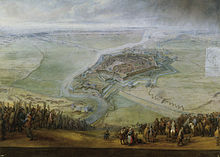FOREIGN POLICY
Characterized by its wars against:
-France
-Netherlands
-Turkish Empire and England.
Philip II maintained the wars with France, for French support to the Flemish rebels, obtaining a great victory in the Battle of San Quentin, fought on 10 August 1557. He built the monastery of El Escorial, a building with a plan in the form of a grill.
The peace of Cateau-Cambrésis was signed in 1559, a treaty in which France recognized Spanish supremacy, Spanish interests in Italy were favored and the marriage was agreed with Isabel de Valois, Queen of Spain.
In 1568, in the northern provinces of the Low Countries, where Calvinism had spread, the population rose up against the king. Felipe II sent the Duke of Alba, who carried out a harsh military campaign but did not manage to contain the war.
He was replaced by Alexander Farnese, who maintained control of the southern provinces (Flanders), although the northern territories ( Unites Provinces) proclaimed their indepedence from the Spanish Crown in 1581. The war lasted until 1648.
Felipe II organised the Holy League in order to end Ottoman control over the Mediterranean sea. This was an alliance between Spain, Venice and the Pope. A Christian fleet was formed to fight against the Ottoman forces, which was commanded by John of Austria. In the naval Battle of Lepanto (1571), the Ottomans were defeated and ceased to be threat.
Battle of Lepanto
Queen Elizabeth I of England supported the practices of the English pirates, who acted against the interests of Spain in the Americas. In addition, Elizabeth was an Anglican and defended the Protestants rebels in the Low Countries against the king of Spain. Felipe II formed a powerfull fleet known as the Armada. Its objetive was to transport troops from Portugal and Flanders, invade England and depose the queen. However, the Spanish fleet was defeated by English attacks of the British Isles.

The Great Armada


No hay comentarios:
Publicar un comentario